Related Research Articles

The Canary Islands, also known informally as the Canaries, are a Spanish region, autonomous community and archipelago in the Atlantic Ocean. At their closest point to the African mainland, they are 100 kilometres west of Morocco. They are the southernmost of the autonomous communities of Spain. The islands have a population of 2.2 million people and are the most populous special territory of the European Union.
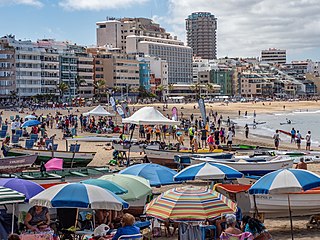
Las Palmas, officially Las Palmas de Gran Canaria, is a Spanish city and capital of Gran Canaria, in the Canary Islands, in the Atlantic Ocean.
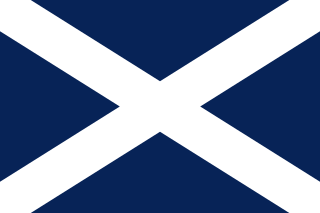
Tenerife is the largest and most populous island of the Canary Islands. It is home to 42.9% of the total population of the archipelago. With a land area of 2,034.38 square kilometres (785.48 sq mi) and a population of 948,815 inhabitants as of January 2023, it is also the most populous island of Spain and of Macaronesia.

Santa Cruz de Tenerife, commonly abbreviated as Santa Cruz, is a city, the capital of the island of Tenerife, Province of Santa Cruz de Tenerife, and one of the capitals of the Canary Islands, along with Las Palmas. Santa Cruz has a population of 206,593 (2013) within its administrative limits. The urban zone of Santa Cruz extends beyond the city limits with a population of 507,306 and 538,000 within urban area. It is the second largest city in the Canary Islands and the main city on the island of Tenerife, with nearly half of the island's population living in or around it.

Berberism is a Berber ethnonationalist movement, that started mainly in Kabylia (Algeria) and Morocco during the French colonial era with the Kabyle myth and was largely driven by colonial capitalism and France's divide and conquer policy. The Berberist movement originally manifested itself as anti-Arab racism, Islamophobia, and Francophilia, that was sanctioned and sponsored by French colonial authorities. The movement later spread to other Berber communities in the Maghreb region of North Africa and was facilitated by colonial policies such as the Berber Dahir. The Berberist movement in Algeria and Morocco is in opposition to cultural Arabization, pan-Arabism and Islamism.
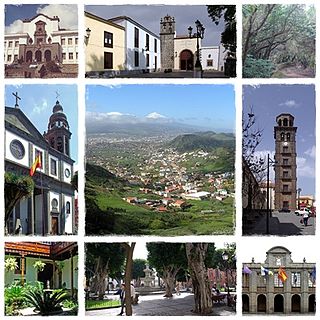
San Cristóbal de La Laguna is a city and municipality in the northern part of the island of Tenerife in the Province of Santa Cruz de Tenerife, on the Canary Islands, Spain. The former capital of the Canary Islands, the city is the third-most populous city of the archipelago and the second-most populous city of the island.

The University of La Laguna is a public research university situated in San Cristóbal de La Laguna, on the island of Tenerife, Spain. It is the oldest university in the Canary Islands. The university has six campuses: Central, Anchieta, Guajara, Campus del Sur, Ofra and Santa Cruz de Tenerife.

José de Viera y Clavijo, was a Spanish, of Portuguese descent, Enlightenment ecclesiastic, poet, historian, botanist, ethnographer, and professor. He is best known for his exhaustive History of the Canary Islands, which took 20 years of work. He was assisted by Fernando de Molina Quesada, José Vandewalle, and others. The first volume was published in 1773, the second in 1774, the third in 1775, and the fourth in 1781. He recognized the Canaries as belonging to Africa and was a proponent of atlantonationalism. He recorded various expeditions from the Canaries in search of Saint Brendan's Island that occurred from 1487 to 1759. He investigated the influence of maritime activities in the Atlantic Ocean on the development of the islands. In this pursuit he also covered sailors such as Blas Zabala y Moreno, Francisco Díaz Pimienta, José Fernández Romero, José González Cabrera Bueno, and Tomé Cano. He was an admirer of Benito Jerónimo Feijóo y Montenegro and Voltaire, having been considered by scholarship after his time the "spiritual son" of the former.
The National Congress of the Canaries is a separatist political party in the Canary Islands, Spain.
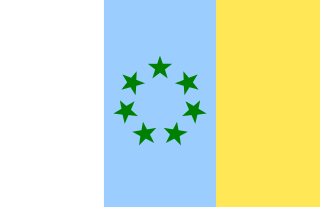
The Movement for the Self-Determination and Independence of the Canary Archipelago, was a Canarian nationalist and socialist organization, founded in 1964 by Antonio Cubillo, whose objective was the secession of the Canary Islands from Spain. During the 1970s, it operated through two terrorist groups: the Guanche Armed Forces (FAG) and the Canarian Armed Detachments (DAC).

Leoncio Afonso Perez was a professor of geography and an intellectual of the Canary Islands.

The Popular Front of the Canary Islands or FREPIC-AWAÑAK is a marginal leftist political party seeking independence from Spain for the Canary Islands.

Canarian nationalism is a political movement that encourages the national consciousness of the Canarian people. The term includes several ideological trends, ranging from a demand for further autonomy within Spain to the right to self-determination.

The Diocese of San Cristóbal de La Laguna, also called Diocese of Tenerife or Diocese Nivariense, is a diocese located in the city of San Cristóbal de La Laguna in the Canary Islands and a suffragan in the ecclesiastical province of the Archdiocese of Sevilla in Spain. The diocese includes the islands of Tenerife, La Palma, La Gomera and El Hierro, in the province of Santa Cruz de Tenerife. The seat has been vacant since 16 September, 2024.

[3]The Guanche Armed Forces was the armed wing of the Movement for the Self-Determination and Independence of the Canarian Archipelago, Spanish: Movimiento por la Autodeterminación e Independencia del Archipiélago Canario(MPAIAC). It was active between 1 November 1976 and late 1978, when the group unilaterally announced a "ceasefire" in what it considered to be "struggle against Spanish colonial occupation" of the Canary Islands.

The Cathedral of San Cristóbal de La Laguna or Catedral de Nuestra Señora de los Remedios is a Catholic church in Tenerife, Spain. Constructed between 1904 and 1915 to replace an earlier building begun in 1515 and designated a cathedral in 1818, it is dedicated to the Virgin of Los Remedios. The cathedral is the mother church of the diocese, which includes the islands of Tenerife, La Palma, La Gomera and El Hierro in the province of Santa Cruz de Tenerife. It is therefore where the episcopal seat of the bishop of this diocese, which is currently vacant following the 2024 retirement of Bishop Bernardo Álvarez Afonso. This is one of the most important churches of the Canary Islands.
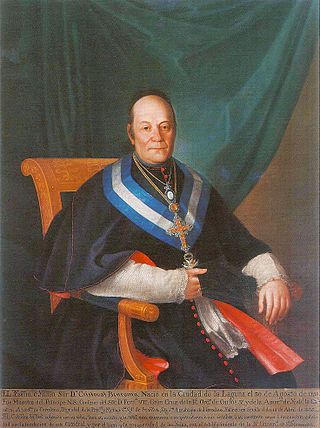
Cristóbal Bencomo y Rodríguez was a Spanish Catholic priest and confessor of King Ferdinand VII of Spain.

The Province of Canary Islands is the name of the former province formed by the Canary Islands. This province had its capital in the city of Santa Cruz de Tenerife. After the provincial division in 1927, this province was composed of the province of Santa Cruz de Tenerife that encompassed the western islands of the Canaries, while the province of Las Palmas covered the eastern islands.
As in the rest of Spain, the majority religion in the Canary Islands is the Catholic Church. The Catholic religion has been the majority since the Conquest of the Canary Islands in the fifteenth century. This religion would largely replace the Canarian aboriginal religion through the prohibition of the latter and syncretism. According to a survey conducted in 2019, Canary Islands is the fifth autonomous community in Spain with the highest percentage of people who declare themselves to be Catholics after the Region of Murcia, Extremadura, Galicia, Aragon, and Castile and León. 76.7% of the population is Catholic.
On 5 April 1978, a failed attempt was made to assassinate Antonio Cubillo by agents of the Spanish police services. The assassination attempt followed a secret meeting in February of that year in Tripoli, the capital of Libya, of an ad hoc Liberation Committee of the defunct Organization of African Unity (OAU), predecessor of the African Union, led by Algeria, which intended to send a Commission to the Canary Islands to oversee their "decolonization".
References
- 1 2 3 "Fallece Antonio Cubillo, líder del Movimiento por la Independencia canaria". El Mundo (Spain) (in Spanish). Retrieved 10 December 2012.
- 1 2 O'Brien, Sally; Sarah Andrews; Chris Andrews; Miles Roddis (2004). Canary Islands. Lonely Planet. p. 25. ISBN 978-1-74059-374-8.
- ↑ Thompson, Virginia McLean (1980). The western Saharans: background to conflict . Taylor & Francis. p. 266. ISBN 978-0-389-20148-9.
- ↑ Woodworth, Paddy (2001). Dirty war, clean hands: ETA, the GAL and Spanish democracy. Cork University Press. p. 57. ISBN 978-1-85918-276-5.
- ↑ "El Guanche". www.canariastelecom.com. Archived 2006-05-15 at the Wayback Machine
- ↑ "Canarias Semanal". Archived from the original on 2017-04-11. Retrieved 2013-03-30.
- ↑ "Historia electoral, Coalición Canaria". www.historiaelectoral.com. Retrieved 2025-01-19.
- ↑ "Cubillo fallece en su casa a los 82 años". www.laopinion.es.